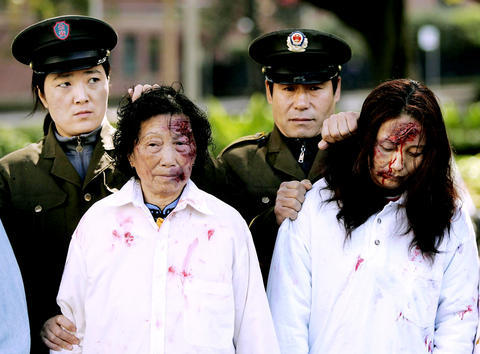Minister of Foreign Affairs James Huang (黃志芳) said yesterday that Taiwan shares the same stance as the US in opposing changes to the "status quo" in the Taiwan Strait.
Huang was responding to Chinese President Hu Jintao's (胡錦濤) statement after his meeting with US President George W. Bush on the sidelines of the APEC summit in Sydney that Taiwan's plan for a referendum on UN membership was an act of "secession," saying Beijing would never tolerate any attempt to separate Taiwan from China.
Bush was quoted by Hu as having clearly said that the US was firmly opposed to any changes in the "status quo."

PHOTO: EPA
Huang said Taiwan agrees with the US' stance and it was China that was making every effort to change the "status quo."
He said China has applied pressure on the UN Secretariat that led to it misinterpreting UN Resolution 2758 to mean "Taiwan is part of the People's Republic of China [PRC]." The resolution in 1971 gave the PRC the Chinese seat in the world body at the expense of the Republic of China -- Taiwan's official title.
Huang also said China has deployed more than 1,000 missiles along its coast opposite Taiwan.
Meanwhile, President Chen Shui-bian (
Chen made the remarks during a teleconference with the American Enterprise Institute in Washington.
Chen said the status quo in the Taiwan Strait is that Taiwan and the PRC are two separate, sovereign countries. He said Taiwan's sovereignty belongs to the 23 million people of Taiwan.
While the US government is preoccupied with the Middle East, Chen urged Washington to pay more attention to Asia, and in particular to the Taiwan Strait. He encouraged the US Congress to play a more proactive role when its country's executive branch tilts in favor of Beijing.
Chen said Taiwan may have played the role of a "good boy" for too long so that the US government took Taipei for granted and ignored its interests.
Chen said he hoped Taiwan and the US would have high-level, substantive dialogue to prevent misunderstandings.
Chen said that both sides would have to sit down and talk about issues such as the UN bid. He said it was wrong that the US had publicly denounced Taiwan and hurt the feelings of the Taiwanese. The US government had also used the issue as an excuse to postpone the sale of F-16 fighter aircraft to Taiwan, he said.
Chen said that the US government treated Beijing very differently, opting to communicate with the authoritarian regime behind closed doors.
Chen dismissed criticism that the proposed referendum was of symbolic value only. He said the poll would be a peaceful and democratic means for Taiwan to say "no" to China.

Taiwan yesterday denied Chinese allegations that its military was behind a cyberattack on a technology company in Guangzhou, after city authorities issued warrants for 20 suspects. The Guangzhou Municipal Public Security Bureau earlier yesterday issued warrants for 20 people it identified as members of the Information, Communications and Electronic Force Command (ICEFCOM). The bureau alleged they were behind a May 20 cyberattack targeting the backend system of a self-service facility at the company. “ICEFCOM, under Taiwan’s ruling Democratic Progressive Party, directed the illegal attack,” the warrant says. The bureau placed a bounty of 10,000 yuan (US$1,392) on each of the 20 people named in

The High Court yesterday found a New Taipei City woman guilty of charges related to helping Beijing secure surrender agreements from military service members. Lee Huei-hsin (李慧馨) was sentenced to six years and eight months in prison for breaching the National Security Act (國家安全法), making illegal compacts with government employees and bribery, the court said. The verdict is final. Lee, the manager of a temple in the city’s Lujhou District (蘆洲), was accused of arranging for eight service members to make surrender pledges to the Chinese People’s Liberation Army in exchange for money, the court said. The pledges, which required them to provide identification

Nine retired generals from Taiwan, Japan and the US have been invited to participate in a tabletop exercise hosted by the Taipei School of Economics and Political Science Foundation tomorrow and Wednesday that simulates a potential Chinese invasion of Taiwan in 2030, the foundation said yesterday. The five retired Taiwanese generals would include retired admiral Lee Hsi-min (李喜明), joined by retired US Navy admiral Michael Mullen and former chief of staff of the Japan Self-Defense Forces general Shigeru Iwasaki, it said. The simulation aims to offer strategic insights into regional security and peace in the Taiwan Strait, it added. Foundation chair Huang Huang-hsiung

’DISTORTION’: Beijing’s assertion that the US agreed with its position on Taiwan is a recurring tactic it uses to falsely reinforce its sovereignty claims, MOFA said The Ministry of Foreign Affairs (MOFA) yesterday said Chinese state media deliberately distorted Taiwan’s sovereign status, following reports that US President Donald Trump agreed to uphold the “one China” policy in a phone call with Chinese President Xi Jinping (習近平). During the more than one-hour-long call, Xi urged Trump to retreat from trade measures that roiled the global economy and cautioned him against threatening steps on Taiwan, a Chinese government summary of the call said. China’s official Xinhua news agency quoted Xi as saying that the US should handle the Taiwan issue cautiously and avoid the two countries being drawn into dangerous